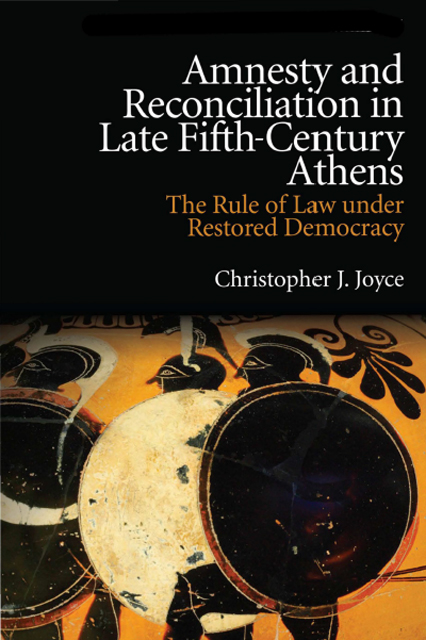Book contents
- Frontmatter
- Contents
- Preface and Acknowledgements
- List of Abbreviations
- 1 Introduction: The Athenian Reconciliation in Modern Scholarship
- 2 Civil Strife at Athens, 404–403
- 3 Oaths and Covenants
- 4 The Legal Scrutiny and the Resurrection of the Rule of Law
- 5 The Amnesty Applied (I): The Trials of Agoratus and Eratosthenes
- 6 The Amnesty Applied (II): The Trials of Callimachus and Socrates
- 7 The Athenian Reconciliation as the Paradigm for the Greek World in the Classical and Hellenistic Ages
- 8 The Rule of Law Restored: The Legacy of the Reconciliation in the Fourth Century
- Bibliography
- Index Locorum
- Subject Index
8 - The Rule of Law Restored: The Legacy of the Reconciliation in the Fourth Century
Published online by Cambridge University Press: 03 June 2023
- Frontmatter
- Contents
- Preface and Acknowledgements
- List of Abbreviations
- 1 Introduction: The Athenian Reconciliation in Modern Scholarship
- 2 Civil Strife at Athens, 404–403
- 3 Oaths and Covenants
- 4 The Legal Scrutiny and the Resurrection of the Rule of Law
- 5 The Amnesty Applied (I): The Trials of Agoratus and Eratosthenes
- 6 The Amnesty Applied (II): The Trials of Callimachus and Socrates
- 7 The Athenian Reconciliation as the Paradigm for the Greek World in the Classical and Hellenistic Ages
- 8 The Rule of Law Restored: The Legacy of the Reconciliation in the Fourth Century
- Bibliography
- Index Locorum
- Subject Index
Summary
The Athenian Reconciliation Agreement was the most successful of its kind ever to have been devised. For the next few centuries, it stood as the exemplum for all political negotiations which succeeded periods of crisis and conflict. Chapter 7 argued that while many city states looked to Athens as the model, not all measured up to its standard. That is not surprising, especially in cases where cities were not democratic or where foreign powers were involved. As mentioned in Chapter 4, modern scholarship has tended to see Athens in the aftermath of the Reconciliation as a less democratic replica of the fifth-century system which succumbed to the Thirty, but that tendency is mistaken. There is nothing in the ancient evidence which suggests that Athens in the wake of the amnesty was any less democratic than the fifth-century democracy which it sought to revive, and indeed the Aristotelian tradition envisages the fourth century as the most advanced stage in the democratic evolution of the city. The main point of difference is that whereas in the fifth century laws were protected by entrenchment clauses, in the fourth century they were legislated through a process known as nomothesia. The rule of law was not antithetical to democracy. It was a sine qua non without which democracy could not function. The achievement of the Reconciliation was to reinstate the rule of law after the period of the Thirty.
The question that follows is whether the democracy which followed the Reconciliation was workable and efficient. In a re-evaluation of the relationship between democracy and rule of law, a convincing case has been made that Athens of the fourth century not only was more democratic even than the late fifth, but that the functioning of democracy was guaranteed by the enshrinement of legal principle. These observations have been carried forward even more recently in the development of the concept of nomos basileus, which envisages the law, rather than the whim of the populace, as the guiding principle of Athenian democracy. As discussed in Chapters 5 and 6, though clever litigants often presented cases in ways which sought to circumvent the legal point at issue, the fact that they had to adopt heavily rhetorical and circuitous methods of doing so indicates not that rule of law was not taken seriously, but to the contrary, that the law was supreme.
- Type
- Chapter
- Information
- Amnesty and Reconciliation in Late Fifth-Century AthensThe Rule of Law under Restored Democracy, pp. 205 - 226Publisher: Edinburgh University PressPrint publication year: 2022



